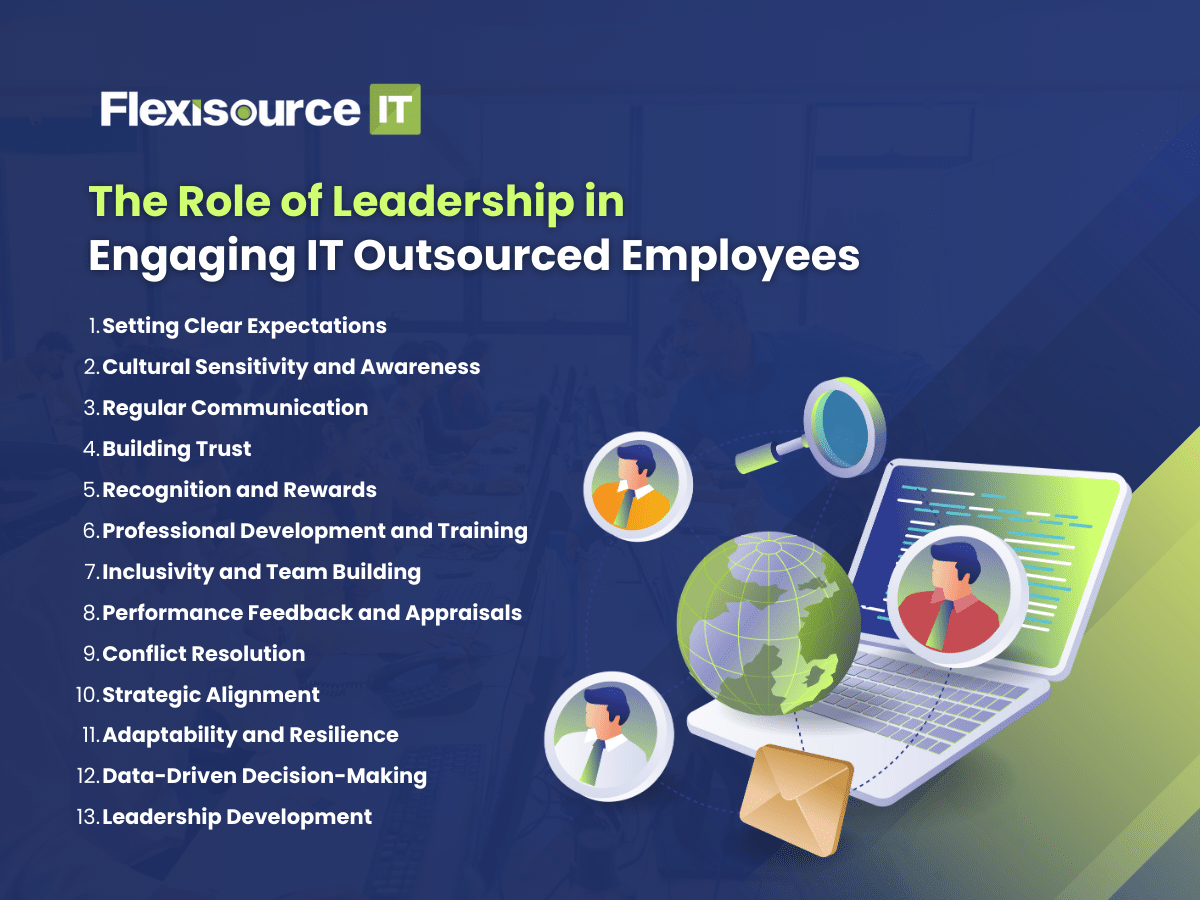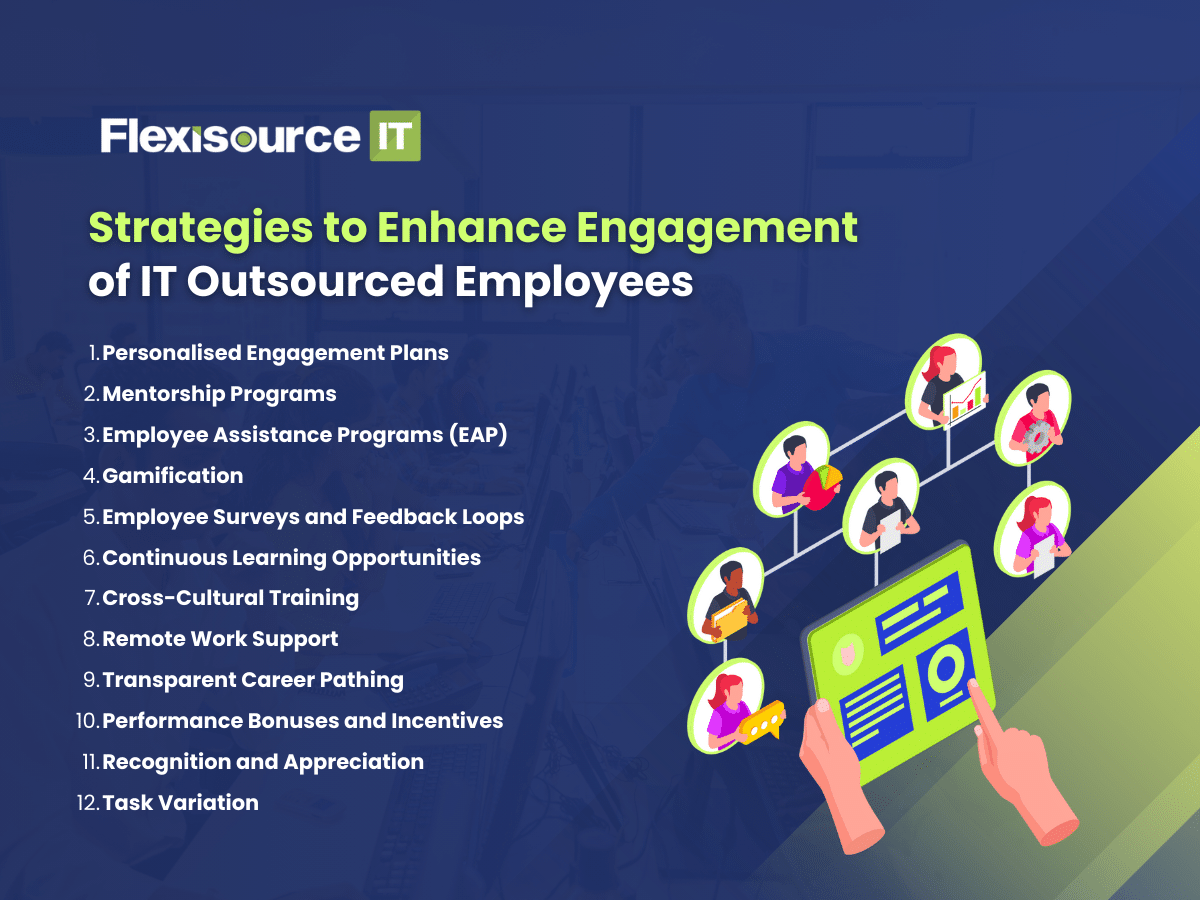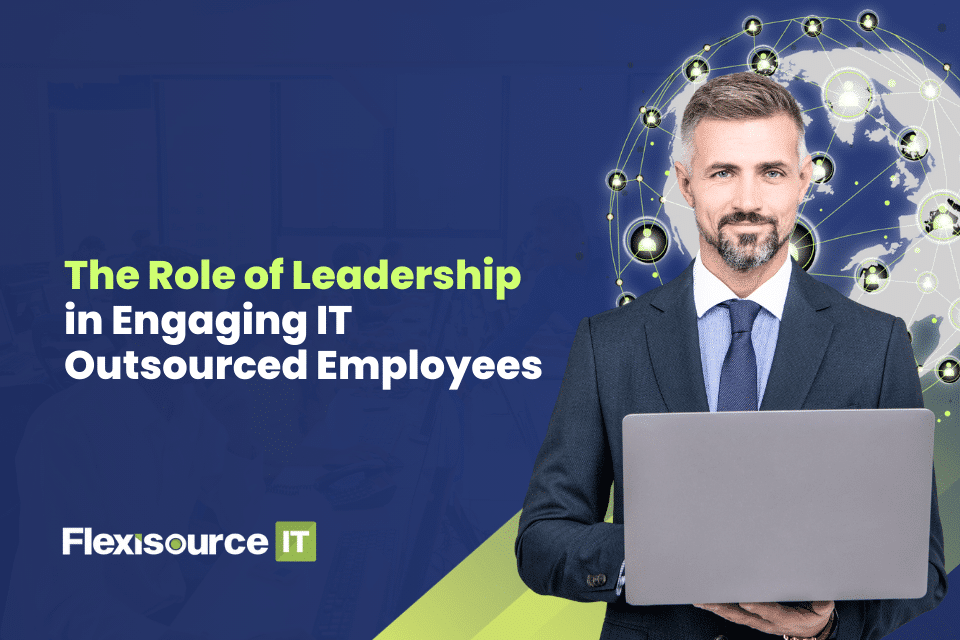| Leadership, IT outsourcing, team engagement, remote teams, employee motivation, leadership strategies |
In today’s rapidly evolving business landscape, information technology (IT) plays a pivotal role in the success and sustainability of organisations across the globe. But, with the current demand for tech and scarcity of IT talents, many businesses opt to outsource their IT functions. This practice of outsourcing IT functions has grown exponentially over the years, giving rise to a new workforce of outsourced IT employees.
However, various employee challenges, particularly engagement and leadership, continue to be present. Engaging outsourced IT employees is an essential task for any organisation aiming to leverage the advantages of outsourcing while maintaining high productivity and quality. And effective leadership, which transcends geographical boundaries, is indispensable in achieving this.
In this article, we will explore the dynamic relationship between leadership and the engagement of IT outsourced employees. We will delve into the various factors affecting this relationship, strategies to enhance engagement, and the significance of effective leadership in this context.
Understanding the IT Outsourcing Landscape
Before we delve into the role of leadership in engaging IT outsourced employees, it’s crucial to understand the IT outsourcing landscape and the factors that have contributed to its growth.
Basically, IT outsourcing is a business strategy where a company contracts out some or all of its information technology functions to a third-party service provider. This outsourcing landscape continually evolves, and understanding it is crucial for businesses seeking cost-effective and efficient IT solutions.
Likewise, here are some advantages and disadvantages of IT Outsourcing.
Advantages of IT Outsourcing
Several factors have fuelled the rapid growth of IT outsourcing:
- Cost Savings. Outsourcing IT functions can be more cost-effective than maintaining an in-house IT department. Labour costs are typically lower in countries where outsourcing is prevalent, and companies can take advantage of economies of scale offered by outsourcing providers.
- Access to Specialised Skills. Outsourcing allows companies to tap into a global talent pool, accessing specialised skills and expertise that may be scarce locally.
- Focus on Core Competencies. Outsourcing non-core IT functions enables companies to focus on their core business activities, improving their efficiency and competitiveness.
- Scalability and Flexibility. IT Outsourcing provides the flexibility to scale services up or down as needed, adapting to changing business requirements.
- 24/7 Support. Many outsourced IT services offer 24/7 support, ensuring businesses can address issues and provide services around the clock.
Disadvantages of IT Outsourcing
While IT outsourcing offers numerous benefits, it also comes with its share of challenges:
- Cultural Differences: Working with teams from different cultural backgrounds can lead to misunderstandings and communication issues.
- Time Zone Differences: Time zone variations can challenge real-time collaboration and communication.
- Data Security Concerns: Outsourcing IT can raise concerns about data security and confidentiality.
- Quality Control: Maintaining consistent quality and performance can be difficult when working with remote teams.
- Employee Engagement: Engaging and motivating IT outsourced employees can be complex.
The Significance of Employee Engagement in IT Outsourcing
The above-mentioned advantages and disadvantages exhibit the importance of employee engagement in ensuring the success of IT outsourcing endeavours. Employee engagement is a multifaceted concept encompassing an employee’s emotional commitment to work, motivation, and overall job satisfaction. Engaged employees are more likely to be productive, innovative, and loyal to their organisations.
Employee engagement is critical in IT outsourcing, where teams are often dispersed across different regions and cultures. Here are some reasons why:
The Engagement-Productivity Connection
Engaged IT outsourced employees are likelier to deliver high-quality work and meet project deadlines. They are also more likely to be proactive, seeking ways to improve processes and contribute positively to the organisation. This IT outsourcing team engagement-productivity connection is well-documented in research and significantly impacts the success of IT outsourcing projects.
Attrition and Retention
High attrition rates among IT outsourced employees can be a significant business problem. It’s costly and time-consuming to recruit and train new team members constantly. Engaged employees are more likely to stay with an organisation, reducing turnover and associated costs.
Quality and Innovation
Engagement often correlates with the quality of work and the ability to innovate. Engaged IT outsourced employees are likelier to go the extra mile to deliver high-quality solutions and contribute creative ideas to projects.
Client Satisfaction
The satisfaction of clients or internal stakeholders who interact with IT outsourced employees is also closely tied to employee engagement. Satisfied clients are more likely to maintain long-term relationships with outsourcing providers.
The Role of Leadership in Engaging IT Outsourced Employees
Given the numerous advantages associated with engaged IT outsourced employees, it is evident that addressing the engagement challenge is essential for the success of IT outsourcing initiatives.
Leadership plays a pivotal role in overcoming this challenge. It is the key to bridging the gap between on-site and outsourced IT teams. Effective leadership is crucial for building trust, communication, motivation, and belonging among outsourced employees.
Here are the various aspects of the role of leadership in IT outsourced employees:

1. Setting Clear Expectations
Clear communication of goals, expectations, and project objectives is vital in IT outsourcing. IT outsourced employees need to understand their roles and responsibilities and how their work contributes to the organisation’s larger objectives. It is crucial to create measurable key performance indicators (KPIs) and service level agreements (SLAs) that serve as benchmarks for monitoring progress.
Leadership should ensure that expectations are articulated in a manner that transcends cultural and geographical boundaries. They must ensure that all internal and external stakeholders comprehensively understand the project’s objectives, scope, and deliverables.
Likewise, leaders must foster an environment where all parties involved have a shared vision and common understanding of the project’s goals and the specific contributions expected from the outsourced team.
2. Cultural Sensitivity and Awareness
The global nature of IT outsourcing often brings together diverse teams, so leaders must be culturally sensitive and aware. Likewise, one role of leadership in IT outsourcing is to recognise and respect cultural differences. They are attuned to nuances in communication styles, work ethics, and business practices.
Likewise, leaders should promote an atmosphere that values and respects cultural diversity. They must recognise that embracing cultural sensitivity is not only a matter of respect but also a way to harness the unique strengths that each cultural perspective brings to the table.
3. Regular Communication
Communication is the backbone of successful IT outsourcing. It is the cornerstone of any successful partnership, and IT outsourcing is no exception. Clear and consistent communication helps build trust, align expectations, and ensure all stakeholders are on the same page.
As such, leaders must proactively establish and maintain regular and open communication channels with outsourced teams. They should develop common channels for communication, ensuring that team members can interact seamlessly, share insights, and address concerns. This includes video conferences, messaging apps, and email platforms to bridge the time sone gap.
4. Building Trust
Another role of leadership in IT is building trust. Trust is the foundation of any successful working relationship. It is a two-way street, and fostering it is pivotal for a successful outsourcing partnership.
Likewise, leaders must take steps to build trust between on-site and outsourced teams. Trust is nurtured through open and honest communication, consistent follow-through on commitments, and predictable decision-making. Leaders should also trust in the capabilities of the outsourced team and empower them with the autonomy to excel in their roles.
5. Recognition and Rewards
Recognition and rewards are powerful motivators for outsourced employees. Acknowledging and rewarding their contributions boosts morale and reinforces the sense of belonging to the organisation. It also fosters a sense of belonging and inspires outsourced employees to go the extra mile in their work consistently.
Thus, leaders should implement recognition and reward systems to motivate outsourced IT employees. This recognition can take various forms, including verbal praise, monetary bonuses, or other incentives.
6. Professional Development and Training
Leaders play a critical role in outsourcing employees’ professional development and training. Investing in the outsourced team’s growth and skills enhancement benefits them and dramatically contributes to the success of the outsourcing partnership.
Likewise, leaders should facilitate opportunities for skill development, improving outsourced employees’ performance and enhancing the overall quality of the work delivered. This, in turn, fosters greater engagement.
7. Inclusivity and Team Building
Inclusivity is an essential aspect of leadership in IT outsourcing. It fosters collaboration and enhances the sense of shared purpose.
Thus, one role of leadership in IT is promoting this essence of inclusivity. Leaders should strive to create a sense of inclusivity and team spirit among all team members, regardless of location. Team-building activities, both online and offline, can go a long way in fostering camaraderie and engagement.
8. Performance Feedback and Appraisals
Regular performance feedback and appraisals are essential for IT outsourced employees to understand their strengths and areas for improvement. It also helps outsourced employees continue to grow and excel in their roles.
Another role of leadership in IT is providing feedback and appraisals. Leaders should provide timely and meaningful feedback to outsourced employees, helping them understand their strengths and areas for improvement. They should conduct fair and constructive evaluations with a focus on continuous improvement.
9. Conflict Resolution
In any working relationship, conflicts are bound to arise. Thus, leaders must be skilled in conflict resolution, serving as mediators to address disputes that may emerge between internal and outsourced teams.
Conflict resolution skills are essential for maintaining a positive working environment and ensuring disagreements do not disrupt project progress. Effective conflict resolution is a testament to the strength of leadership in IT outsourcing.
10. Strategic Alignment
Another role of leadership in IT is their ability to align strategies. Strategic alignment is vital to ensure that IT outsourcing remains a value-added strategy rather than a potential source of misalignment.
Successful leadership in IT outsourcing involves ensuring that the work of outsourced teams aligns seamlessly with the organisation’s broader strategic objectives. Leaders should continually assess the outsourcing arrangement to ensure it remains synchronised with the company’s goals and adapts to the evolving business landscape.
11. Adaptability and Resilience
The IT landscape is constantly evolving, and outsourced employees must be adaptable to remain competitive. Being flexible to industry changes is fundamental to long-term success.
Influential leaders should actively encourage adaptability and resilience among outsourced employees. This means helping them embrace change, learn new technologies or methodologies as needed, and develop the ability to pivot quickly in response to industry trends or shifts.
12. Data-Driven Decision-Making
Leaders must harness data analytics to make informed decisions in today’s data-centric world. Data-driven insights can help identify areas for improvement and optimisation.
By leveraging data, leaders can monitor outsourced employees’ performance, identify improvement areas, and make strategic decisions to enhance productivity and efficiency. Data-driven leadership ensures the outsourcing arrangement remains optimised and aligned with the organisation’s objectives.
13. Leadership Development
The role of leadership in IT outsourcing is not a static skill; it is a continuous process of growth and development. Influential leaders should invest in their growth and development to ensure they have the skills to lead outsourced teams effectively.
This includes honing communication, negotiation, and interpersonal skills and staying updated on industry trends and best practices in outsourcing management. Leadership development is an ongoing journey, and leaders should consistently strive to enhance their capabilities.
Strategies to Enhance Engagement of IT Outsourced Employees
Leaders can employ various strategies to enhance the engagement of IT outsourced employees:

- Personalised Engagement Plans. Develop customised engagement plans for each IT outsourced employee, considering their unique strengths, weaknesses, and motivations. One size does not fit all in engagement strategies.
- Mentorship Programs. Establish mentorship programs where experienced team members can guide and support new members. This enhances engagement and accelerates the integration of new team members.
- Employee Assistance Programs (EAP). Offer EAPs to provide outsourced employees with emotional and psychological support when needed. A healthy work-life balance contributes to higher engagement
- Employee Surveys and Feedback Loops. Regularly seek feedback from IT outsourced employees to understand their concerns, suggestions, and areas for improvement. Act on this feedback to demonstrate that their voices are valued.
- Continuous Learning Opportunities. Provide ongoing learning opportunities, such as online courses and certifications, to help IT outsourced employees develop their skills and stay engaged.
- Cross-Cultural Training. Offer cross-cultural training to enhance understanding and collaboration among team members from diverse cultural backgrounds.
- Remote Work Support. Ensure that IT outsourced employees have the resources and support to work effectively from their remote locations.
- Transparent Career Pathing. Create transparent career pathing and development plans, giving IT outsourced employees a sense of direction and purpose.
- Performance Bonuses and Incentives. Implement performance-based bonuses and incentives to reward exceptional contributions and motivate high performance.
- Recognition and Appreciation. Regularly recognise and appreciate the achievements and efforts of IT outsourced employees, creating a positive work environment.
- Task Variation. Offer a variety of tasks to prevent monotony and maintain motivation. A diverse range of responsibilities can keep employees engaged.
Conclusion
In the ever-evolving landscape of IT outsourcing, the role of leadership cannot be overstated. As explored in this article, effective leadership is the linchpin for engaging IT outsourced employees, driving success in outsourcing partnerships, and ensuring alignment with organisational goals. Whether it’s setting clear expectations or nurturing trust and recognition, leadership practices are essential to achieving the full potential of IT outsourcing.
At Flexisource IT, we understand the vital importance of great leaders and project managers in IT outsourcing. With a wealth of experience, a commitment to cultural sensitivity, and a relentless focus on delivering results, we’re here to help you unlock the true potential of your outsourced teams. Our dedicated team of professionals is adept at fostering inclusivity, providing ongoing training, and harnessing data-driven decision-making to optimise your outsourcing endeavours.
So, as you navigate the intricate world of IT outsourcing, remember that leadership is the compass guiding the way. Choose Flexisource IT, where leadership and expertise converge to ensure your success in every outsourced project.
Contact us today and experience the difference outstanding leadership and project management can make in your IT outsourcing journey. Your success is our commitment.





